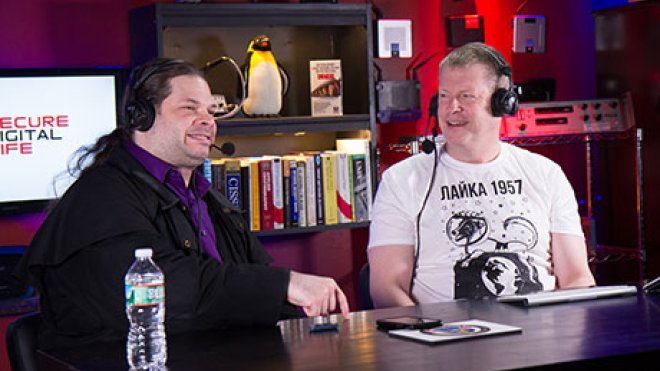Securing Your Digital Life: Two RWU Faculty Experts Host Weekly Cybersecurity Podcast
The podcast serves as introduction to the field of cybersecurity

BRISTOL, R.I. – Have you heard of terms like cryptocurrency, blockchain, encryption, Linux, binary, or VPN? Have you wondered exactly what they mean or how they work? If so, you might consider tuning into Secure Digital Life, a weekly podcast meant to introduce listeners to the realm of information security – a world that in this digital age has increasing relevance to all phone, computer and device users.
The podcast, hosted by RWU cybersecurity experts Doug White and Russ Beauchemin, features weekly episodes covering topics in cyber that are relevant to listeners getting introduced to the field and listeners looking to stay informed and keep their digital information secure.
Together, the two hosts bring listeners a wealth of knowledge on cybersecurity.
White is a recognized expert in the technology industry and is RWU’s cybersecurity and networking program director. He was one of the earliest pioneers of cybersecurity and has worked in the industry for over 20 years. Beauchemin is RWU’s director of instructional support and learning innovation for the cybersecurity program. He has 15 years of experience working in the field of educational technology and is an expert in emerging technologies, tele-presence robots and virtual, augmented and mixed reality.
The pair say cyber issues affect almost everyone, so it’s important people have the information they need to stay safe digitally.
“More people don’t understand these topics than people that do,” White said.
Beauchemin agrees.
“Doug and I want to bring these users into the security realm by introducing them on a foundational level to principles of cybersecurity,” he said. The goal “is to get them to practice safe computing.”
For that reason, the pair have run episodes on topics like password creation and protection, securing digital backup files and avoiding phishing scams. They also have covered larger topics like the Equifax data breach and the WannaCry attack.
“When something big comes up that we think is of interest to the general public, we tend to cover it,” White said.
Reaction to the show has been largely positive, White and Beauchemin say. The pair just posted their 52nd episode.
Notable episodes, so far, include one on Artificial Intelligence led by Beauchemin and two episodes where White interviewed Rhode Island Congressman Jim Langevin, chair of the Congressional Cybersecurity Caucus, on a range of cyber topics and on Net Neutrality.
New episodes are available Tuesdays. Episodes are live streamed on Facebook and Youtube from 12:30 p.m. to 1 p.m the same day.
Secure Digital Life is part of a number of shows on Security Weekly, a digital security podcast network based in Rhode Island that was started by Paul Asadoorian – one of the world’s leading experts on cybersecurity.
Asadoorian was looking to add a show to Security Weekly that served a more general audience and acted as a bridge to some of the other podcasts hosted on the network. He turned to White and Beauchemin, who had each previously guest hosted shows on Security Weekly.
The pair say they’ve heard from a number of listeners who follow the show. Followers range from Cyber Patriot youth teams, to journalists, to college-aged students studying cybersecurity and those who are interested in pursuing it. It’s why White and Beauchemin have done episodes on resume writing and degrees available in cybersecurity – such as certificate, bachelor or master's degree programs, like ones offered at RWU.
Their fan base keeps growing, White and Beauchemin say. It has even gone international.
At a conference in South Dakota, they were having dinner when a woman who was visiting the U.S. recognized them from the show and approached. They signed her an autograph, took photos with her and sent a message, through her, to a group of her friends outside the U.S. who are fellow fans.
“We love your show,” the woman said to them.